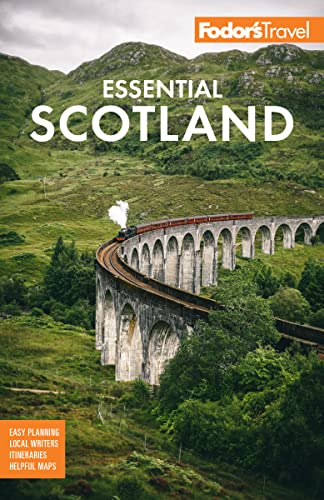Scotland Today
It may have just 5.4 million people, but today Scotland has some big ideas about where it's headed socially, culturally, and economically. International sporting events, the lively (but ultimately defeated) 2014 referendum on whether to become an independent nation, and even First Minister Nicola Sturgeon's state visits to the United States and elsewhere continue to focus worldwide attention on Scotland.
Travel in the 21st Century
The experience of traveling in Scotland has changed markedly for the better in recent years, with wholesale improvements in standards of hospitality and food especially.
Today hotels and restaurants charge prices similar to those in the rest of the United Kingdom. On the other hand, most of Scotland’s biggest and best museums and galleries are free. Walk through well-tended gardens, along bustling waterfronts, and in beautifully renovated neighborhoods—a good day out can show you everything but cost nothing at all.
In 2020 Scotland presents its Year of Coasts and Waters, celebrating its varied and spectacular coastal scenery. In 2022 the focus will be on the country's rich storytelling traditions in the Year of Scotland's Stories.
Independence and Brexit
Dominating Scotland’s public life in recent years has been the relationship of Scotland with the United Kingdom. Parliament and the increasingly troubled state of this 300-year-old union. Through devolution, Scotland elected its first parliament in 300 years in 1999. In 2014 the independence referendum saw 55% vote against Scotland becoming an independent country. But that vote by no means resolved the matter, especially given the unpopularity in Scotland of the 2016 U.K. vote to leave the European Union, or Brexit, when only 38% of Scots voted to leave and 62% to remain. With the prospect that leaving the single-market European Union might lead to further economic turmoil across the United Kingdom, First Minister of Scotland Nicola Sturgeon has called for a second independence referendum, due to a significant material change. Sturgeon's Scottish Nationalist Party (SNP) reset the timetable for triggering "IndyRef 2" for when the outcome of Brexit negotiations plays out in late 2019 (or so says the current plan—the official exit date of the United Kingdom has been pushed back several times over the last year).
Besides the prospect of being dragged out of the European Union against the wishes of its people, why are many Scots dissatisfied with the U.K. government? In a time of budget woes, the Westminster government has been slashing public services. Many of these cuts deeply offend the Scots, who are committed to free education and free health care from the publicly owned National Health Service. Many commentators predict that Brexit-induced economic turmoil and further erosions of public services by newly elected (and largely reviled) Prime Minister Boris Johnson will hasten another independence vote.
Culture
The arts continue to thrive, a sign of Scotland's creative energy. Edinburgh’s arts festivals grow bigger every year, attracting visitors from around the globe. The National Theatre of Scotland has been such a resounding success that productions have made their way to Broadway. Glasgow is renowned for contemporary arts: Glasgow artists often win the Turner Prize, Britain’s most prestigious art honor.
In a sign of vitality, culture is not confined only to the large cities. Far to the north, Shetland (already drawing audiences with its folk festivals) has built Mareel, a remarkable live-music venue and cinema. Dundee is the United Kingdom's sole UNESCO City of Design (Detroit represents the United States) and is the location of the first outpost of London’s Victoria and Albert Museum, opened in 2018. Perth's renewal will center on the transformation of Perth City Hall into a museum and gallery.
Land
It’s a disturbing fact that just 500 people own half the land in Scotland, many of them wealthy foreigners who have become absentee landlords. Experts say that giving residents a say on what happens to the land they live on is crucial if communities are going to thrive. New models of community ownership and management are being hard won, particularly in the Western Isles. There have been some community buyouts in which farming communities get the government's help to purchase the land where they live and work.
Still the depopulation of rural Scotland continues. The popularity of holiday homes has meant that some villages are fully inhabited for only a few weeks each summer. Those who want to live here permanently find that low wages, a high cost of living, and a lack of affordable housing mean that they are priced out of a home surrounded by such beauty.
Wind Power
Urged by the government to help the country meet its ambitious targets for renewable energy, Scottish landowners began leasing land to the corporations behind wind farms. Scotland now has many large-scale commercial wind farms—including Europe’s largest—and hundreds of smaller ones, many in community ownership. This has sparked vociferous debate. The pro-wind lobby argues in favor of emission-free energy that's better for the environment than coal or nuclear plants, while the anti-wind camp decries the environmental damage to ancient peat bogs and bird populations.
Turbines are now being built offshore, which is another cause for dispute. Donald Trump, who ignored environmental activists while building his sprawling golf estate, had a very public fallout with government officials over the "ugly" planned offshore turbine plant that will be visible from his golf course. Now the American president, Trump continues to withhold the multimillion-dollar investment he promised at the outset.
Scotland, Finally Winning
When it comes to sports, the Scots have reveled in their traditional role as the underdog. But Olympic gold medal–winning cyclist Chris Hoy and tennis Grand Slam winner Andy Murray have shown that this narrative needs rewriting.
As well as regularly hosting major golf tournaments, Scotland has proved itself of late as a worthy and welcoming venue for prestigious international events. After the success of the Glasgow Commonwealth Games in 2014 and with St. Andrews hosting the landmark 150th Open Golf Championship in 2021, pride and participation in Scottish sports is growing.




